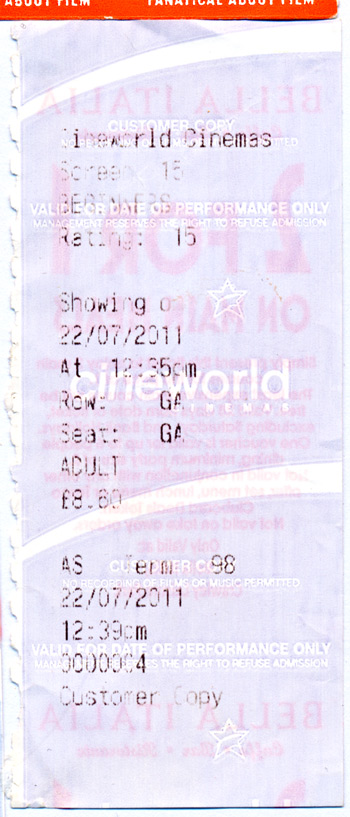Beginners

Risk Management Seminar
Once upon a time, I tried to make a movie about kid’s show host named Dr. Scientist who would explain How Wars Work. It was great, because 1) it never got finished, so I never had to prove that it was, and 2) I played Dr. Scientist. I remember there was a scene that took place in Amoeba Records between fans of Alicia Keys and Jets from Brazil (it was 2005, when these bands existed and people bought records) who went to war with one another over their taste in music.
The point being that things that we like inexplicably provoke often extreme reactions in the negative, as if the existence of Dave Matthews and anyone who likes him means that the music you like is just music you like, instead of the greatest music ever recorded. How could something that makes you so happy not be true?
Dr. Scientist was trying explain religious wars from this perspective, and though he effectively solved the Pakistani/India conflicts, ended the war on Terror, and managed to unite North and South Korea, he was still unable to explain the existence of Dave Matthews, who is just terrible, and invalidates all the music I like.

And so we come to Beginners, which I thought I wouldn’t like and did, and you should see, especially if you think you won’t. One could argue that all films are a question of aesthetic, which would make anything I say redundant and pointless. Though I certainly agree that anything I say is redundant and pointless, that’s just because I basically have one idea, and I just repeat it over and over again.
But within the various aesthetics, there is an achievable narrative coherence, which, to my mind, follows, or fails to follow, a certain structure. You can have films that have little, if any, structure (see Essential Killing, Drive Angry, or In the Name of the King: A Dungeon Seige Tale. That wasn’t an cf, by the way, but a directive: see them), but if we’re talking about films without the benefit of either spectacle or total insanity, they rise and fall on the gifts (and usually, the the deficits) of honesty and wit. If you can’t be both, at least be one.
And, even you hate it, Beginners has both. Honesty is a willingness to be ugly (or worse yet, embarrassed) onscreen, just as wit can be an awareness of the surprise we experience when we find ourselves acting honestly.
Both involve the simple contradiction that how we think we are going to act is rarely how we will. James Ellroy said that Chandler writes how we want to be, and Wambaugh writes how we are, and I think that good movies lie somewhere between the two. Beginners, and its ilk (I would include Ratatouille, Once, Reprise and the work of David Milch) exist between real life (which is 1) boring, and 2) has zero narrative structure), and the typical filmic version, where dishonesty is a seductive narrative device.
Romantic comedies can have perfect soulmates, just as action films can have bad guys who are just motivationlessnessly evil. The worst offenders in the dishonesty category would have to be the Save Me Whitey, Save Me films (I’m 95% sure that’s an established genre – see Mississippi Burning, Snow Falling on Cedars, Schindler’s List (weird, but technically true – Mr. Spielberg could have just as easily made a movie about Sobibor), Australia, Amistad, and Dances With Wolves, and those were not recommendations. Those were cf’s). These always include an anachronistic white character who magically grew up without the endemic racism of their time, who then single handedly save all the non-white people, who apparently can’t organize, protest, fight, or think for themselves, thus embodying the racism of our time.
This may be selling the film short; not that it’s racist, though it may be, since according to me, everything is, but that it still manages, on an art-film budget, to break through filmically, as Mr. McGregor imagines various graphic depictions of the history of sadness, and, poignantly, makes change in his head for his father’s tumor which was the size of a quarter. These bits may be precious, but they work (or don’t, as you will have to see for yourself) for the reasons as they form part of a light and difficult dance between story-telling and real-life, which emerges in both the structure of the film, and the dog (of course. I would say it’s the dog).
The structure involves two timelines as Mr. McGregor takes care of his dying father (Mr. Plummer) and the other as he meets and woos Ms. Laurent and what could be messy, or structurally lazy (like all the movies and television shows that begin with a bang, and then cut to 48 hours earlier, because the story isn’t interesting enough to tell in order. Now, instead of being bored until the end, you’ll just be bored after the beginning. Go get some M&Ms), instead emerges as an emotional necessity, that the intercutting seems less like flashbacks than memories, as things in the present remind one of moments in the past, and, as is often the case, the reverse.
But the tricky line between the sidewalk of movies (so to speak) and the neighborhood grass of the real (also, so to speak) is best walked by the character of the dog, to whom Mr. Mills has endowed with subtitles to express his thoughts. Such a thing could be irksome in the extreme, as in Cats & Dogs: The Revenge of Kitty Galore and its ilk, but these subtitles are instead a sounding board for Mr. McGregor’s thoughts. After his first night with Ms. Laurent, it’s the dog that expresses the unrealistic, and true, expectations of all romance: ‘Are we married yet?’
You're seeing a $1 to $300 million dollar film for $12. This is the best bargain in global capitalism, and I, for one, am terrified that someone is going to find out and close the loophole. Please: don't tell anyone.
Or should I say my unrealistic and true expectations of all romance? Because I was touched by the film, wept throughout, and am just too clever to say it. The dog’s best line – ‘We knew it wouldn’t work even before we met her’ – is something I wish I had known about myself previously, even though knowing it now doesn’t seem to change a thing.
And this is why you should see everything. Well, not everything, but everything that I tell you to see. Because choosing and going to a movie is always a kind of risk management strategy, where the entertainment value of the film (X1) as a function of the time spent as T multiplied by Y (the number of surprise cameos by Bruce Willis) and the inverse square of Z (the slight camera push in to convey character interest), plus the cosine of S (the things thrown at the camera in 3D) the sum of which would then be divided by P (the year that the closing credits song was produced – 2011) as the logarithmic function of the rotten tomatoes rating, where RT=.2 if the rating is 97% or higher, aka the Star Trek/Meek’s Cutoff rule, .7 if between 1% and 96%, and 4.5 if the rating is 0% (also known as the 88 Minutes/National Lampoon’s Gold Diggers rule). Always see a film if no one likes it.
This is my formula of course, but given all the internet nonsense and various medias and, God forbid, actual human contact, you will have a similar one, where you try to guess if the film is worth your time and money. This is pointless for two reasons: one, because as my friend Richard has pointed out, you’re seeing a $1 to $300 million dollar film for $12. This is the best bargain in global capitalism, and I, for one, am terrified that someone is going to find out and close the loophole. Please: don’t tell anyone.
But secondly: you just can’t know. Because there’s a second kind of risk, the kind that can’t, or shouldn’t be managed, the risk that good filmmakers take when they open their heart. Beginners didn’t just remind me of films that I liked, but also of ones I hated, like Synchdoche, New York, Submarine or Dead Man. These were films that I didn’t like, but which I didn’t stop thinking about after I had seen them. I fully acknowledge that these are films that have the qualities of honesty and wit, but with whom I have no personal connection. Even if I film hits all the right notes, and the characters, story and structure are united, there’s still the bottom line of whether or not it meshes with you the way it meshes with someone else. Like poor Dave Matthews, they just didn’t sound like music I listened to when I was 4.
For the rare filmmakers who don’t hide behind genre or pastiche, who put it emotionally on the line, their risk deserves our attention. You may be grinning the entire time, or wanting to tear a hole in the screen, but you should go even if X1<2.2. Even then.
$35.99
The Lonely Comments Section

 [logo]
[logo]

